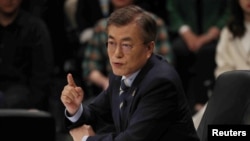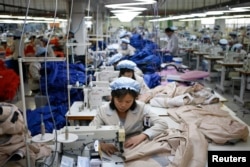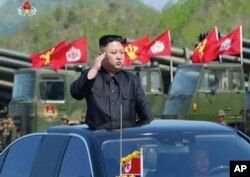In February 2016, Yoo Chang-geun and about 120 other South Korean businessmen frantically pulled their staff out of the Kaesong Industrial Zone, jointly run with North Korea. Seoul had ordered it closed after Pyongyang defied international warnings and tested a long-range rocket.
Now, with South Koreans in next week’s presidential election almost certain to elect liberal Moon Jae-in, they have reason for hope. Moon has promised to reopen the complex, the signature project of the so-called “Sunshine Policy” of engagement with North Korea pursued earlier this century.
“We are more hopeful than ever,” Yoo said. “Moon might not be able to reopen Kaesong right away but he will follow steps toward it in the course of improving South-North Korean relations.”
Trading sunshine for concessions
But reopening Kaesong could go against the spirit of U.N. sanctions to prevent money from going into North Korea’s banned weapons programs, government officials and experts say.
And for Moon to justify a return to engagement, North Korea would first need to at least signal a concession, said Lim Eul-chul, a professor at Kyungnam University in South Korea.
“Most importantly, not to make further provocation, like no more nuclear and missile tests. It can come out and show some kind of forward-looking stance, even if it is just words,” Lim said.
North Korea hinted at further nuclear tests as recently as this week, saying it will bolster its nuclear force “to the maximum” and “in a consecutive and successive way.”
The isolated country has carried out five nuclear tests and a series of missile tests despite ever-tightening U.N. and other international sanctions. North Korean leader Kim Jong Un has vowed to launch an intercontinental ballistic missile at any time that can strike the mainland United States with a nuclear weapon.
Wages to weapons
Born out of the first of only two summits between leaders of the two Koreas in 2000, the Kaesong project opened to much fanfare in 2004 as a model of commercial cooperation: capital would come from South Korea and cheap labor from the North.
But critics say hundreds of millions of dollars paid to North Korea over the years as wages for workers at Kaesong were used to fund the development of nuclear weapons and missiles.
North Korea had demanded that the wages be paid to the state and not directly to the workers.
Best path to peace
Jong Kun Choi, who advises the 64-year-old Moon on foreign policy, said the candidate believes better inter-Korean relations is the best way to provide security on the Korean peninsula.
Moon, the son of North Korean refugees who came to the South during the 1950-53 Korean War, would end nine years of conservative rule in Seoul if elected, a time when Pyongyang stepped up its nuclear and missile tests.
“We want to be in the driver’s seat. Driving would mean doing so very actively with the United States, and Pyongyang.”
But he acknowledged the next administration would inherit “some very bad circumstances” that would make it difficult to simply revert to the engagement policies of previous liberal presidents Kim Dae-jung and Roh Moo-hyun, who served from 1998 to 2008.
“How can we inject so-called Sunshine Policy into a situation that is so different to 10 years ago?” Choi told Reuters.
Moon, a human rights lawyer who was a top aide to the late president Roh, has Washington worried his more moderate approach could undercut efforts to increase pressure and sanctions on Pyongyang, senior South Korean government officials said.
Moon’s election would also complicate the deployment of the Terminal High Altitude Area Defence (THAAD) system. He has repeatedly said the incoming administration should decide whether to deploy the anti-missile system and it should be ratified by parliament.
Wild card factor
A conservative president in Washington and a liberal president in Seoul may not necessarily be an incompatible mix, said John Delury at Seoul’s Yonsei University. Both Moon and Trump, for instance, have indicated they would be willing to meet with Kim Jong Un.
“There’s the wild card factor,” said Delury. “It takes us back to one of Trump’s first statements about North Korea where he said why don’t we talk to the guy. He shares a premise there with South Korean liberals. Are these two guys really so out of joint?”
North Korea’s state media has been quiet about the candidacy of Moon, shielding him from the harsh invective usually reserved for conservative leaders in Seoul.
Rhetoric aside, Moon has said it will be practically impossible to renew dialogue with Pyongyang if it conducts another nuclear test.
Yoo, who employed 430 North Korean workers at a semiconductor parts manufacturing plant in Kaesong, said his revenue has halved since he was forced to leave the industrial zone last year.
A February survey conducted by the association of South Korean companies that operated in Kaesong showed that two-thirds were willing to go back to Kaesong.
“We don’t want to see our companies leaving for China and Vietnam. We want to go back to Kaesong, a symbol of South-North economic cooperation,” Yoo said.
Yoo likened the two Koreas to a divorced couple, saying talks for resumption of the Kaesong project can be “beginning for the divorced couple to get back together.”







